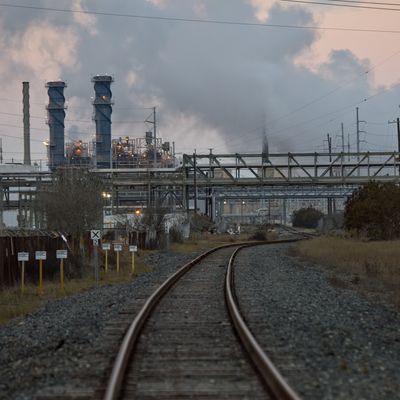
The energy crisis in Texas has exposed the glaring weak points of a regional power system designed to ignore cold weather extremes and federal oversight. Not only did the decision not to weatherize the state’s energy infrastructure result in blackouts for millions of Texans — which in turn resulted in water shortages for nearly 12 million more — preliminary data from the Texas Commission on Environment Quality shows that a spike in air pollutants occurred when petrochemical stations and oil refineries on the Gulf Coast were forced to go offline.
Because electric supplies were also cut off for the plants on the coast, these refineries burned the gas in the system to prevent damage from taking place in their processing units. This practice, known as flaring, darkened the skies above the state’s massive refinery centers and sent thousands of tons of air pollutants into the atmosphere in the span of a little over a week. The five largest oil refiners alone emitted close to 337,000 pounds of pollutants, including carbon monoxide, benzene, hydrogen sulfide, and sulfur dioxide. In Houston, over 703,000 pounds of pollutants from energy facilities were burned off last week.
As Reuters and the advocacy group Environment Texas note, this is a tremendous excess. The Houston burn-off constitutes about 3 percent of total pollution over permitted amounts allowed for 2019 and almost 10 percent of that number for 2018. Meanwhile, the 118,100 pounds of pollutants emitted at the Motiva refinery in Port Arthur was over three times the excess emissions it declared to the Environmental Protection Agency in 2019. Exxon Mobil’s plant in Baytown emitted 68,000 tons of carbon monoxide and almost one ton of benzene. As Sharon Wilson, a researcher at the advocacy group Earthworks, told Reuters, this last amount is particularly distressing because “there is no safe amount of benzene for human exposure.”
The emissions, worrying in their own right, are a reminder of — and a factor exacerbating — the reality that uncertain weather patterns will become more frequent in a world with an unstable climate. But will the state, embarrassed and battered by the collapse of its fragile energy infrastructure, do anything to prepare for the freeze next time?
Over a decade ago, the state was warned by federal regulators that their plants could not be relied upon to work in severely cold weather. However, utilities did not heed recommendations to insulate and heat their pipes. Because the state does not penalize companies for failing to cold-weatherproof their pipelines, it’s an open question whether the investigation into February’s mess will result in significant changes. “Are you going to winterize if you don’t get your money back?”Alan Scheller-Wolf, a professor of operations management at Carnegie Mellon University’s Tepper School of Business, asked in an interview with Bloomberg. “The Texas industry values less regulatory mandates and they value having their separate detached power grid, so I would find it unlikely that they are going to hit their companies with a raft of regulation.”






























